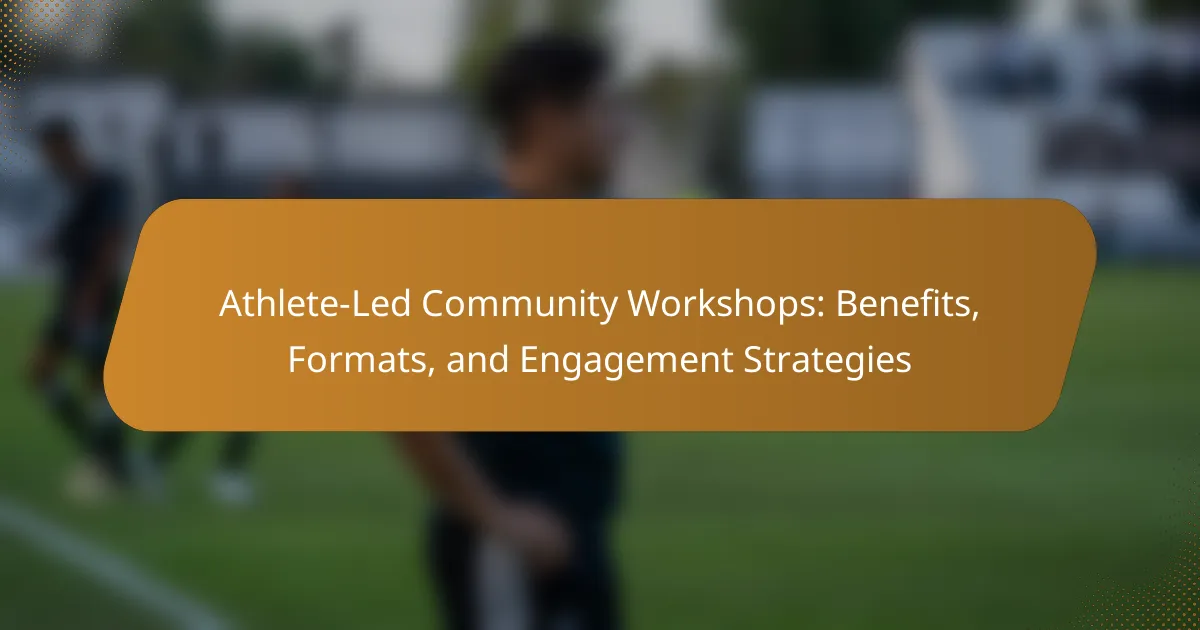Athlete-led community workshops enhance motivation, improve skills, and strengthen community ties. These workshops take various interactive formats and encourage participant engagement through hands-on activities and personal storytelling. Challenges include communication barriers and varying skill levels, which require athletes to adapt their teaching methods. Successful workshops focus on clear objectives, diverse training methods, and fostering a supportive environment for collaboration.
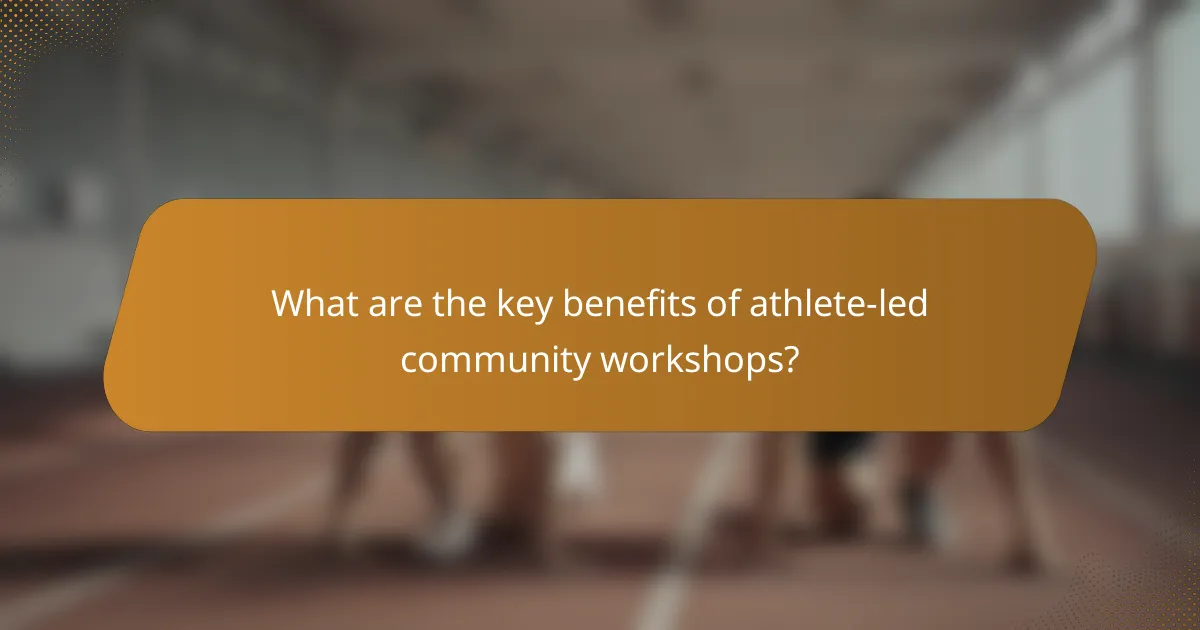
What are the key benefits of athlete-led community workshops?
Athlete-led community workshops offer numerous benefits, including enhanced motivation, improved skills, and stronger community ties. Participants gain insights directly from experienced athletes, fostering a sense of belonging and inspiration. These workshops promote physical activity, mental well-being, and personal development, creating a positive impact on attendees’ lives. Additionally, they encourage collaboration and networking among community members, leading to long-lasting relationships and support systems.
How do these workshops enhance community engagement?
Athlete-led community workshops enhance engagement by fostering connections and building trust. These workshops create a platform for athletes to share experiences and inspire participants. They often include interactive activities that encourage participation, making community members feel valued. Additionally, these workshops promote physical activity and wellness, reinforcing a sense of belonging and collective purpose.
What impact do they have on youth development?
Athlete-led community workshops significantly enhance youth development by fostering teamwork, leadership, and resilience. These workshops provide practical skills and mentorship, creating positive role models. Participants often experience improved self-esteem and social connections, which contribute to their overall well-being. Engaging with athletes encourages youth to pursue healthy lifestyles and develop a sense of community.
Which health benefits are associated with participation?
Participation in athlete-led community workshops offers numerous health benefits, including improved physical fitness, enhanced mental well-being, and increased social connections. These workshops promote active lifestyles, which can lead to better cardiovascular health and weight management. Engaging in group activities fosters a sense of belonging, reducing feelings of isolation. Additionally, participants often experience boosts in motivation and self-esteem, contributing to overall life satisfaction.
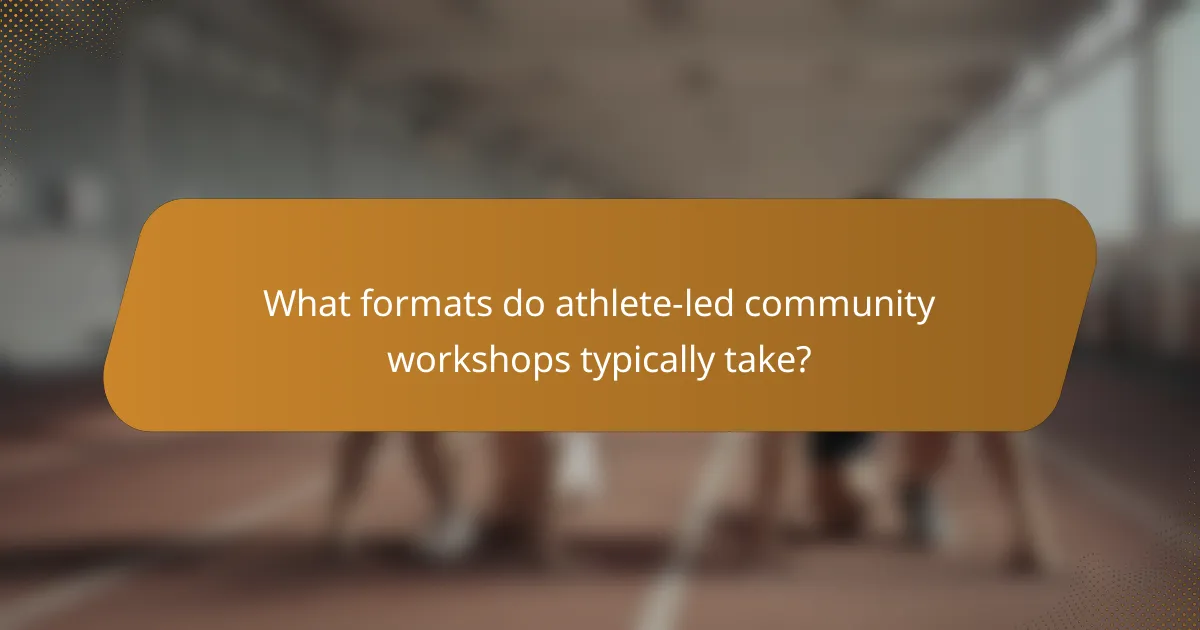
What formats do athlete-led community workshops typically take?
Athlete-led community workshops typically take the form of interactive sessions, clinics, and mentorship programs. These formats foster engagement through hands-on activities, personal storytelling, and skill development. Workshops may also include panel discussions, Q&A sessions, and networking opportunities. Each format aims to enhance community connection and promote physical activity.
How do in-person workshops differ from virtual formats?
In-person workshops foster direct interaction, while virtual formats prioritize accessibility. In-person settings enhance engagement through real-time feedback and networking opportunities. Virtual workshops can reach a broader audience, allowing participants from diverse locations to join. Each format has unique benefits that can cater to different community needs and preferences.
What role do collaborative events play in workshop success?
Collaborative events significantly enhance workshop success by fostering engagement and community building. These events create opportunities for athletes to share experiences, facilitating peer learning and motivation. Participants often feel more connected, leading to increased attendance and active involvement. Collaborative formats, such as group discussions and hands-on activities, can also promote skill development and knowledge sharing, ensuring a richer workshop experience.
Which types of activities are most effective in workshops?
Interactive activities are most effective in athlete-led community workshops. These activities foster engagement and enhance learning through hands-on experiences. Examples include skill-building drills, team challenges, and group discussions. Such formats promote collaboration and allow participants to apply concepts in real-time, leading to better retention and enjoyment.
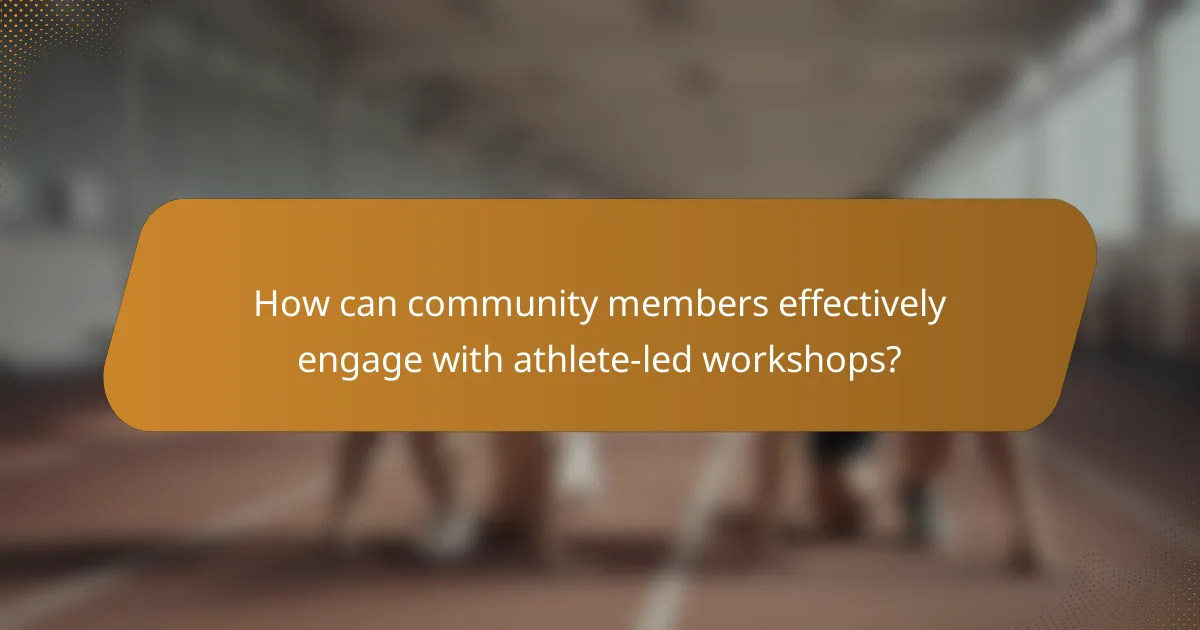
How can community members effectively engage with athlete-led workshops?
Community members can engage effectively with athlete-led workshops by actively participating, asking questions, and providing feedback. These workshops offer unique opportunities for skill development and personal growth. Participants should prepare by researching the athlete’s background and focusing on specific areas of interest. Engaging with fellow attendees fosters a supportive atmosphere, enhancing the overall experience. Additionally, applying learned skills in practice sessions solidifies knowledge gained during workshops.
What strategies can athletes use to foster participation?
Athlete-led community workshops can enhance participation through interactive formats and engagement strategies. These workshops foster connection by creating a supportive environment, encouraging athletes to share experiences and skills.
Engagement strategies include hands-on activities, Q&A sessions, and collaborative projects. Tailoring workshops to local interests boosts attendance and involvement. For example, athletes can lead sport-specific clinics that attract diverse participants.
Additionally, leveraging social media for promotion increases visibility and reach. Engaging local schools and organizations can further amplify participation, creating a network of support around the workshops.
Ultimately, athlete-led initiatives create a sense of community, inspiring others to join and participate actively.
How can feedback from participants shape future workshops?
Feedback from participants significantly enhances future workshops by identifying strengths and areas for improvement. It fosters a sense of ownership among athletes, promoting engagement. This input can refine workshop formats, ensuring they align with participant needs. Additionally, it can highlight unique attributes, such as preferred activities or topics, which can be integrated into future sessions. Regularly collecting and analyzing feedback creates a cycle of continuous improvement, leading to more effective and enjoyable workshops.
Which outreach methods are most successful in attracting attendees?
Athlete-led community workshops attract attendees most successfully through personalized outreach, social media engagement, and partnerships with local organizations. Personal invitations from athletes create a sense of connection. Social media platforms amplify reach, allowing for targeted promotions. Collaborating with local organizations enhances credibility and access to wider audiences.
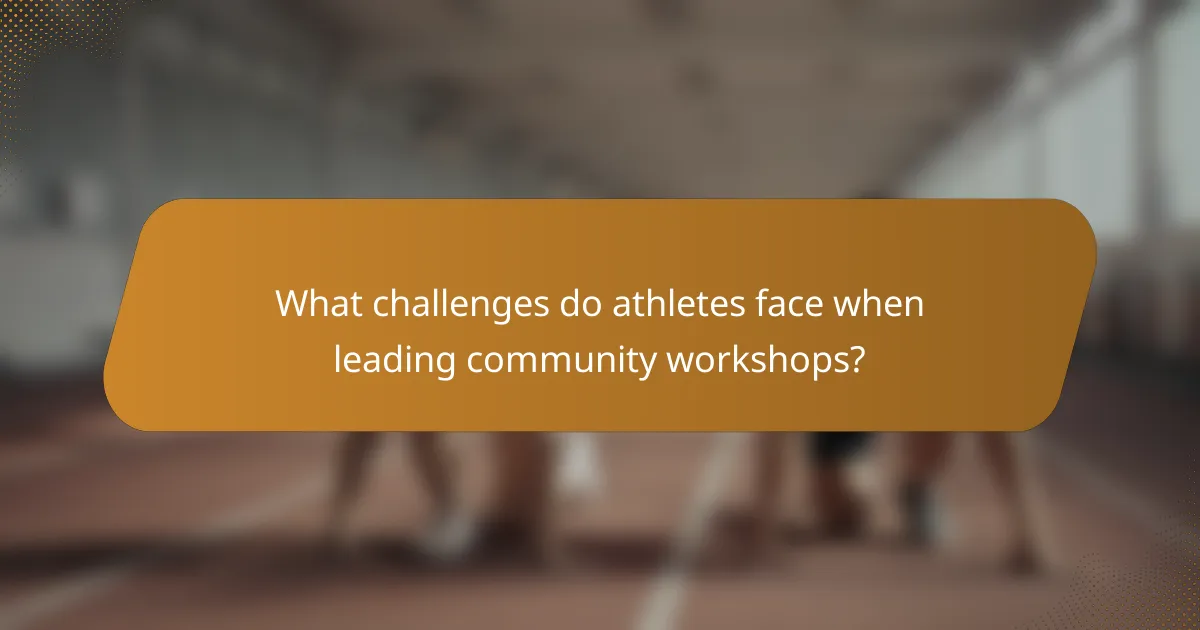
What challenges do athletes face when leading community workshops?
Athletes face several challenges when leading community workshops, including communication barriers, time constraints, and varying skill levels among participants. Effective communication is crucial yet can be difficult, as athletes may need to simplify complex concepts. Time management is essential, as athletes often balance training and competition schedules with community engagement. Additionally, participants may have different backgrounds and abilities, requiring athletes to adapt their teaching methods to ensure inclusivity and effectiveness.
How can athletes overcome logistical issues in organizing workshops?
Athletes can overcome logistical issues in organizing workshops by utilizing effective planning and collaboration strategies. Establishing clear communication with stakeholders ensures everyone is on the same page. Additionally, leveraging technology for scheduling and promotion can streamline the process. Engaging local community resources, such as schools or sports clubs, can provide venues and support. Creating a checklist of necessary materials and tasks will help maintain organization throughout the planning phase.
What are common misconceptions about athlete-led initiatives?
Common misconceptions about athlete-led initiatives include the belief that they lack structure, are only for elite athletes, and do not address community needs. These initiatives often provide organized formats, engage diverse participants, and focus on relevant social issues. For example, workshops led by athletes can foster community development and promote health awareness. Additionally, some think athlete-led initiatives are solely for publicity. In reality, many athletes genuinely seek to make a positive impact through sustained engagement.
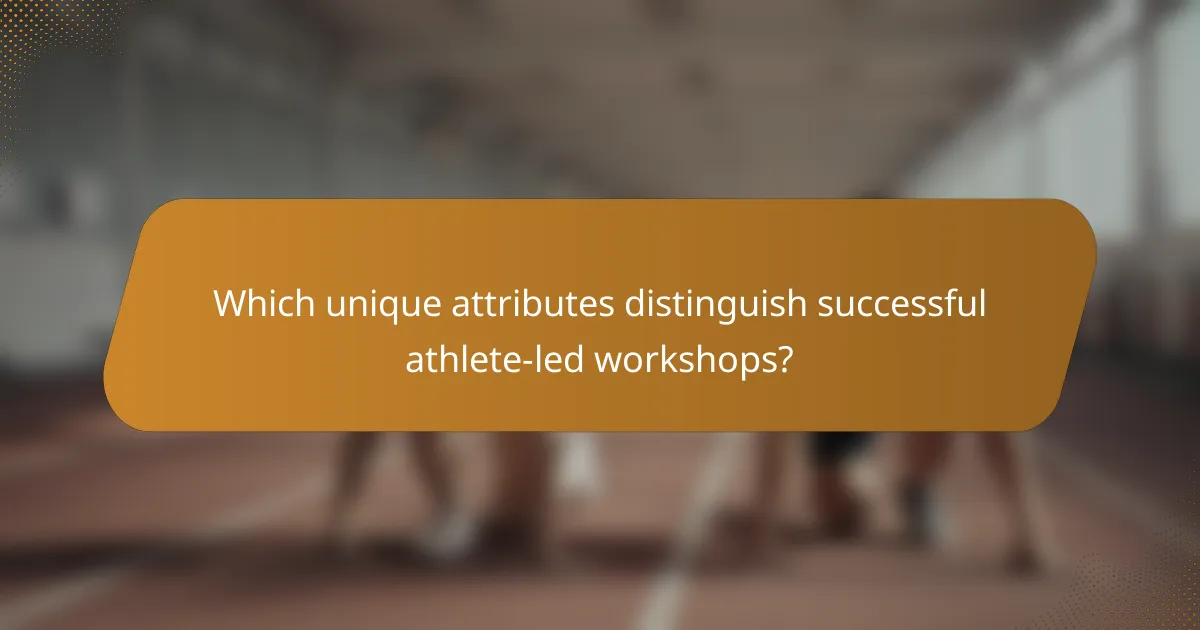
Which unique attributes distinguish successful athlete-led workshops?
Successful athlete-led workshops are distinguished by personalized engagement, real-world experience sharing, and community-building focus. These unique attributes foster trust and inspire participants. The authenticity of athlete-led initiatives enhances relatability, creating a supportive environment for learning and growth.
How do personal stories enhance the impact of workshops?
Personal stories significantly enhance the impact of workshops by fostering connection and relatability. They create an emotional bond, making content more memorable. Participants often engage more deeply when they see real-life applications of concepts. For instance, an athlete sharing their journey can inspire others to overcome challenges. This unique attribute of personal storytelling transforms workshops from mere information sessions into powerful platforms for motivation and community building.
What innovative techniques have emerged in recent workshops?
Athlete-led community workshops have introduced innovative techniques such as interactive skill-building sessions and peer mentorship programs. These approaches enhance engagement by fostering collaboration and creating a supportive environment. Additionally, incorporating technology, like virtual reality training, allows for immersive experiences that deepen learning. Such techniques promote inclusivity and accessibility, ensuring wider participation among diverse athlete communities.
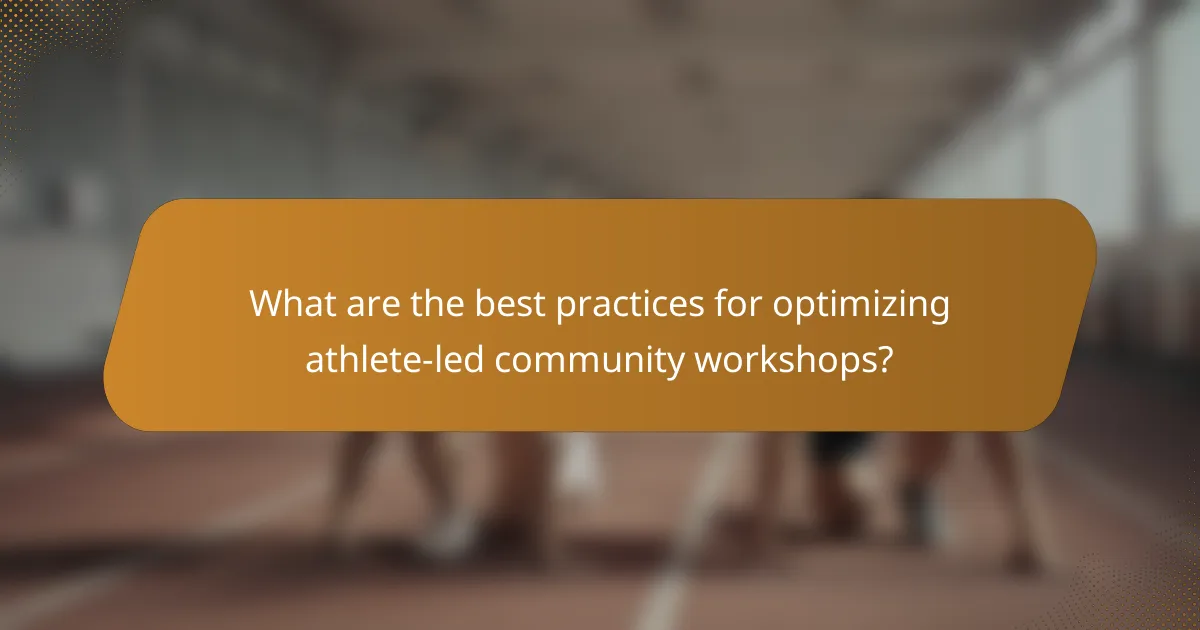
What are the best practices for optimizing athlete-led community workshops?
To optimize athlete-led community workshops, focus on clear objectives, participant engagement, and effective feedback.
1. Define clear goals for each workshop to guide activities and measure success.
2. Use interactive formats such as group discussions, hands-on activities, and Q&A sessions to enhance engagement.
3. Incorporate diverse training methods, including presentations, demonstrations, and personal stories from athletes to cater to different learning styles.
4. Gather feedback post-workshop to assess participant satisfaction and identify areas for improvement.
5. Foster a supportive environment that encourages sharing and collaboration among participants.
What common mistakes should be avoided when planning workshops?
Common mistakes to avoid when planning athlete-led community workshops include inadequate audience research, unclear objectives, lack of engagement strategies, and insufficient follow-up. Each mistake can hinder effectiveness and diminish participant satisfaction.
Inadequate audience research leads to programming that may not resonate with participants. Unclear objectives result in workshops lacking focus and direction. A lack of engagement strategies can cause low participation and enthusiasm. Finally, insufficient follow-up prevents building lasting relationships and community impact.
How can continuous improvement be integrated into workshop planning?
Integrating continuous improvement into athlete-led community workshops involves regularly assessing and refining the planning process. Start by collecting feedback from participants after each workshop to identify strengths and areas for growth. Implement changes based on this feedback to enhance future sessions. Additionally, establish clear goals and metrics for each workshop, allowing for measurable evaluation of success. Foster a culture of collaboration among facilitators to share insights and best practices, ensuring ongoing development and engagement.
